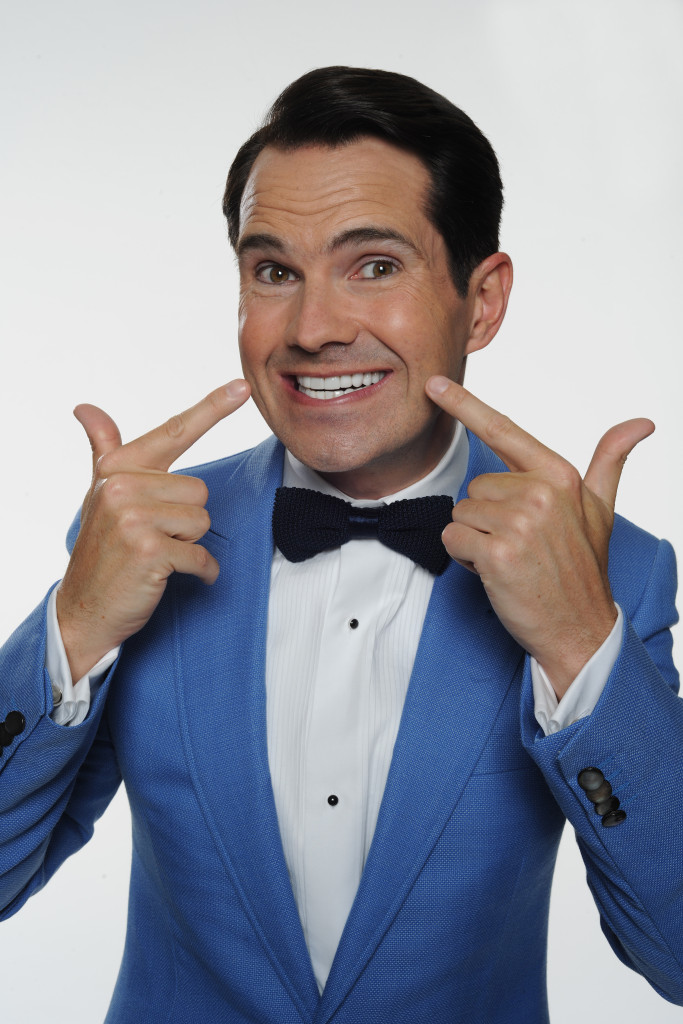Comedian Jimmy Carr talks political correctness and not “refusing the muse”
By Bryan Moxon, May 3 2016 —
Jimmy Carr is an award-winning British stand-up comedian known for his witty one-liners and controversial jokes. He will perform a sold-out show at MacEwan Hall on Friday, May 6 as part of his international world tour Funny Business. We sat down to chat with Carr about his experience in the business of comedy.
The Gauntlet: Do you find that the shows at colleges are different than the theatres that you usually play? Do you have a preference between the two?
Jimmy Carr: I very rarely play at a college these days. But certainly back in England, if there’s a venue that’s on a college campus, you’d get an audience skewing a little bit younger, which is always a good thing. I’ve always had quite a young audience. I’m not that young of a guy, but I always get a lot of young people coming to see the show. I think maybe I’ve got arrested development. Maybe my humour is best suited for a couple of drinks in your early 20’s.

Courtesy Just For Laughs
G: Jerry Seinfeld said that he doesn’t do colleges anymore because of the political correctness on campuses. Have you had any experiences with PC culture?
Carr: Not really. I think political correctness has a place in our society, and that place is not in a theatre when a comedy show is on. If you went to see a doctor, let’s say, with an embarrassing medical complaint, and the doctor said “whip your dick out, let me have a look at it,” you would be offended. I think PC has a place — you don’t want to say it’s a bad thing because it’s a very good thing, the idea that people use the right terminology in the right situation. But the idea that it would apply to comedy is ridiculous and I think people get a bit carried away on university campuses.
G: Audience participation is a big part of your show. Do you find that the things people say to you in Canada and the United States are of a different nature than in the UK?
Carr: Well, otherwise, it’s just me. It feels like comedy at it’s best should be a conversation, and the laughter is the response. It’s a very one-sided conversation but you get an immediate feedback loop with comedy. It seems crazy that nobody says anything at a comedy show — I like it when people join in and they maybe heckle a little bit. It’s very good natured. Everyone has paid to be there and they have the same sense of humour, so there’s no downside. People are much more polite here. I thought people were polite in America and then I came to Toronto, and they were polite. They are just getting more polite at every stop.
G: The jokes that you tell are mostly one-liners. When you were starting out, did you always know that you wanted to do one-liners?
Carr: Not really — I think that your sense of humour chooses you. I could write one-liners. I’m lucky that I can write one-liners. I like lots of different types of comedy — I’m a bigger comedy consumer than I am a producer — and I love people telling long intimate stories about their real life, but it’s not my sort of thing.
G: How often do you write jokes?
Carr: Every day. You know, I sit and go through them and edit them every once in awhile, but every day you’ll think of something and write something down. Hopefully when you put together the things you wrote down in the last year, you’ve got a show. I never refuse the muse. If you have an idea, no matter how silly or inconsequential, always write it down, and then go back in a couple of days and see what it looks like. The audience is the ultimate test, once you’ve got 50 or 100 lined up you can go test them in front of an audience.
G: Many comedians talk about how they struggled for a long time before they learned their craft. Did you have a similar experience?
Carr: No. Is that bad? Not really, I mean a couple of times it didn’t go well, but just a couple of times. Generally I think it may be an easier methodology if you tell one-liners as opposed to writing stories. If you think about it in terms of a storyteller writing a 20-minute routine, he’s trying to carve a statue out of marble, whereas I’m building with lego bricks. So each one works, and you just put another one after it. It becomes quite easy to do those early gigs, because when something works, it’s locked in. And the feedback is immediate, you are constantly getting feedback from the audience.
G: Your tour is Funny Business. What kind of response from the audience are you expecting?
Carr: The thing that I always say is that if you’ve seen it on DVD, Youtube or Netflix, or wherever you’ve seen me perform, then coming out to see it live is always a very different experience to be in a room, live, with lots of different people with the same sense of humour as you.
Interview edited for clarity and brevity.
For more information on the Funny Business tour, visit jimmycarr.com
